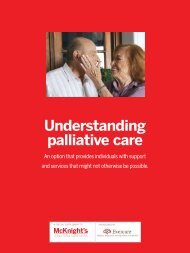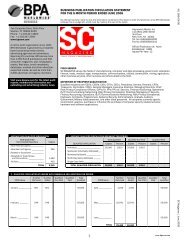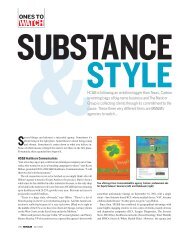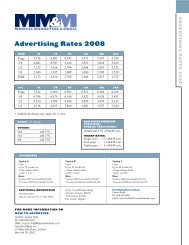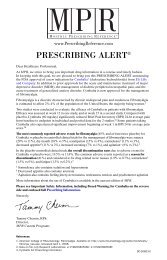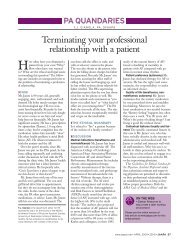Review - Haymarket Media Group
Review - Haymarket Media Group
Review - Haymarket Media Group
Create successful ePaper yourself
Turn your PDF publications into a flip-book with our unique Google optimized e-Paper software.
Commentary<br />
ed in a high rate of failure to complete the 12 weeks<br />
of taxane therapy. Some have argued that if a greater<br />
proportion of patients had completed therapy on the<br />
docetaxel arms, the survival for those arms would<br />
have been superior to the paclitaxel arms. I would<br />
argue that survival for patients on the weekly paclitaxel<br />
arm was at least as good as for patients on any<br />
of the other treatment arms, and the toxicity was less,<br />
making it better tolerated and therefore the preferred<br />
treatment.<br />
The results of this study are consistent with other<br />
studies that suggest that weekly paclitaxel is superior<br />
to every-3-week paclitaxel, and that every-3-week<br />
docetaxel is superior to weekly docetaxel. Why the<br />
optimal schedule is different for the two taxanes is<br />
not known. This is supported by the study by<br />
Seidman and colleagues of paclitaxel in the metastatic<br />
setting, as well as by studies of docetaxel in breast<br />
cancer and other diseases. 6,7<br />
One question that remains unanswered is the<br />
comparative efficacy of weekly paclitaxel versus<br />
dose-dense paclitaxel (administered every 2 weeks).<br />
Citron and colleagues demonstrated that cyclophosphamide<br />
and doxorubicin followed by paclitaxel<br />
was more effective if administered every 2 weeks<br />
versus every 3 weeks. 8 Sparano and colleagues<br />
administered the cyclophosphamide/doxorubicin<br />
cycles every 3 weeks and compared weekly taxane<br />
versus every-3-week taxane. Although there is no<br />
direct comparison between weekly and dose-dense<br />
paclitaxel, one might expect them to be roughly<br />
similar based on the relative advantage of each of<br />
these regimens when compared with every-3-week<br />
therapy.<br />
Finally, one must ask why it has taken us so long<br />
to determine optimal dose schedules for one of the<br />
most widely used and effective classes of therapies<br />
16 The American Journal of Hematology/Oncology<br />
for breast cancer – the taxanes – which has been in<br />
our armamentarium for quite a long time. F<br />
References<br />
1. Sparano JA, Wang M, Martino S, et al. Weekly paclitaxel in the<br />
adjuvant treatment of breast cancer. N Engl J Med. 2008;358:<br />
1663-1671.<br />
2. Winer E, Berry D, Woolf S, et al. Failure of higher-dose paclitaxel<br />
to improve outcome in patients with metastatic breast<br />
cancer: Cancer and Leukemia <strong>Group</strong> B trial 9342. J Clin Oncol.<br />
2004;22:2061-2068.<br />
3. Jones SE, Erban J, Overmoyer B, et al. Randomized phase III<br />
study of docetaxel compared with paclitaxel in metastatic<br />
breast cancer. J Clin Oncol. 2005;23:5542-5551.<br />
4. Valero V, Jones S, Von Hoff D, et al. A phase II study of docetaxel<br />
in patients with paclitaxel-resistant metastatic breast cancer.<br />
J Clin Oncol. 1998;16:3362-3368.<br />
5. Chevallier B, Fumoleau P, Kerbrat P, et al. Docetaxel is a major<br />
cytotoxic drug for the treatment of advanced breast cancer: a<br />
phase II trial of the Clinical Screening Cooperative <strong>Group</strong> of<br />
the European Organization for Research and Treatment of<br />
Cancer. J Clin Oncol. 1995;13:314-322.<br />
6. Seidman AD, Berry D, Cirrincione C, et al. CALGB 9840: phase<br />
III study of weekly (W) paclitaxel (P) via 1-hour (h) infusion<br />
versus standard (S) 3h infusion every third week in the treatment<br />
of metastatic breast cancer (MBC), with trastuzumab (T)<br />
for HER2 positive MBC and randomized for T in HER2 normal<br />
MBC. J Clin Oncol. 2004;22(July 15 suppl):6s. Abstract 512.<br />
7. Burstein H, Manola J, Younger J, et al. Docetaxel administered<br />
on a weekly basis for metastatic breast cancer. J Clin Oncol.<br />
2000;18:1212-1219.<br />
8. Citron ML, Berry DA, Cirrincione C, et al. Randomized trial of<br />
dose-dense versus conventionally scheduled and sequential<br />
versus concurrent combination chemotherapy as postoperative<br />
adjuvant treatment of node-positive primary breast cancer:<br />
first report of Intergroup Trial C9741/Cancer and<br />
Leukemia <strong>Group</strong> B Trial 9741 [published correction appears in<br />
J Clin Oncol. 2003;21:2226]. J Clin Oncol. 2003;21:1431-1439.<br />
Author disclosures: consultant: EMD Serono, Serenex.<br />
Correspondence address: Lawrence N. Shulman, MD, Dana-<br />
Farber Cancer Institute, 44 Binney Street, Boston, MA 02115;<br />
phone: (617) 632-2277; fax: (617) 632-2260; e-mail: Lawrence_<br />
Shulman@dfci.harvard.edu.





